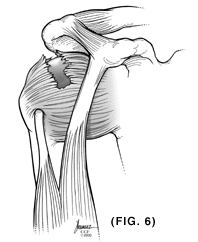It is estimated that Rotator Cuff (RTC) Disease increases with age and affects roughly 4% to 32% of the population. The Rotator Cuff muscles and tendons keep your shoulder in its socket and much more. The Scapula also known as the "Shoulder Blade" is probably one of the most unassuming yet critical of all components of the shoulder. Most of the population believes it's just part of their back yet it is extremely complex. There are 18 Muscles that connect to the scapula but the specific muscles of "The Cuff" region: Supraspinatus, Infraspinatus, Teres Minor, and Subscapularis (SITS) join a set of critical tendons which are often what surgeons are assessing when they discuss Rotator Cuff (RTC) injury.
Shoulder Impingement is typically a compression or entrapment of the Rotator Cuff (RTC) Tendons leading to inflammation. This is happening roughly at the end of your collar bone by your shoulder joint. This is believed to be one way that the RTC Tendons become injured and even torn (other thoughts are aging, overload, etc..) Most often shoulder complaints from shoulder irritation are brought on through sports and occupation- the latter likely due to repetitive stresses. Raising the arms above shoulder level in an occupation or sport, regularly and repetitively, increases the probability of shoulder problems. Irrespective of initial insult to RTC tissues, poor movement patterns can exacerbate a shoulder problem and should be corrected. Sometimes we go from an inflamed tendon to a torn tendon because we don't address faulty movement patterns. *Cumulative trauma to RTC tendons are believed to cause the majority of Rotator Cuff Tears. (Fig.6)
The Rotator Cuff tendons are always at risk and should be protected through methodical shoulder movements, correct posture, stretching, and minimizing overuse and trauma. Forward slumped shoulders/posture closes the space around RTC tendons. Improper posture does play a role in shoulder pain and shoulder problems. Muscle weaknesses, muscle strength imbalances, poor posture/ form, injury, etc... all alter mechanical balances and load distributions which can negatively affect the Shoulder tissues leading to pain, weakness, loss of function, debilitation, and possibly surgery if not corrected.
Shoulder Physical Therapy Programs are often asserted to improve the area around the RTC Tendons and usually include highly specific stretching and strengthening. Initial goals may be to relieve pain but ultimately to correct dysfunction, return to proper functioning, and keep the RTC muscles and associated tendons safe from injury.
Post-Operative Shoulder Rehabilitation Programs are very specific to the surgeon and dependent on to what and where their repair is performed. Surgeons have their own protocol to follow after surgery and it is imperative to listen. Typically for a Rotator Cuff Repair the primary goal is maintaining the integrity of the repair while: gradually increasing Range of Motion, Lowering Pain and Inflammation, and minimizing Muscle Atrophy. Most RTC Rehabilitation protocols Do Not allow: heavy lifting, supporting bodyweight with hands and arms, jerking motions, nor excessive behind-the-back movements even at 6 weeks post-op. "Repair tissue does not reach maximal tensile strength for a minimum of 12–16 weeks post repair." (Int J Sports Phys Ther. 2012 April; 7(2): 197–218.) It is important to understand what "Passive Range of Motion" means. For a surgeon-defined time after your surgery, only your therapist will be moving your arm. This could be 4 weeks. In this defined time period the surgical repair site cannot stand active muscle contractions by the patient--the forces are too great on the surgical repair. Active motion of the arm by the patient is added later in your rehabilitation. Your Physical Therapist will carry out your surgeon's protocol so no worries.
Keep your shoulders healthy. One good practice is to "Love what You Lift" carrying objects close to your body. When surgery is needed listen to your Therapist and Surgeon carefully to guide you through Physical Therapy with the best results.
Rotator Cuff Tear. (Credit: Nature.com)



